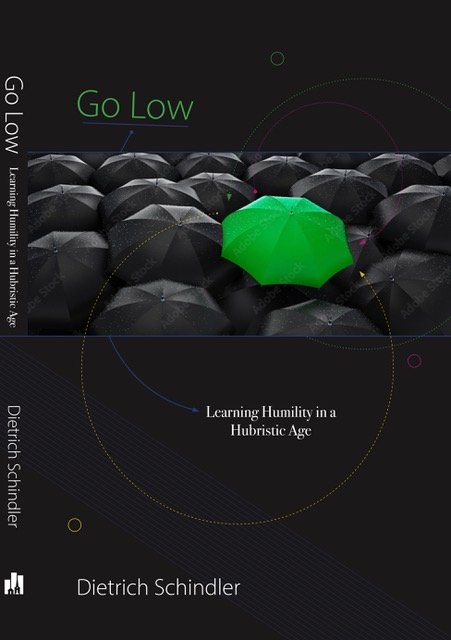Chapter Three - Darkness
Chapter Three
Night
“And now hundreds of cries rose at once. The death rattle of an entire convoy with the end approaching. All boundaries had been crossed. Nobody had any strength left. And the night seemed endless.”[i]
- Elie Wiesel
I recently met Harper. Harper is twelve years old, but by her own admission “almost thirteen.” Harper lives with her family on the lake on which our family has had a cottage for almost fifty years. She is also currently going through confirmation classes, learning the Ten Commandments and the Apostle’s Creed by heart. I asked Harper if I could ask her a question. “Sure”, was her response. So, I dove in; “if you could ask God one question, what would it be?” Long silence. Then she replied, “I would ask God, how will the world end?” What a great question.
With Pride as our guide, we now come to entertain Harper’s question slightly reformulated: how will the world of the proud, the over confident end? Answer, it will end with the greatest climate change imaginable. It will end not only in darkness, but in outer darkness. All will be intolerable, abject night.
Eliezer was fifteen years old when he, his mother and father along with his little sister Tzipora were herded into box cars in a train in their native Hungary. They were on their way to unbelievable horror; places that could only be aligned with hell, towns like Birkenau, Auschwitz, and Buchenwald. His family was annihilated, their remains ascending the crematoriums of Nazi concentration camps. Elie survived, but his belief in God did not.
On April 10, 1945 American soldiers entered the concentration camp of Buchenwald near Weimar, Germany and freed Elie along with other remaining Jewish captives. Elie vowed to remain silent for fifteen years internally attempting to process and ultimately give voice to unspeakable horror. Then he spoke. In 1958 he published a slim volume that is the title of our chapter, the book is called Night.
We listen in stunned silence to his words:
Never shall I forget that night, the first night in camp, that turned my life into one long night seven times sealed.
Never shall I forget that smoke.
Never shall I forget the small faces of the children whose bodies I saw transformed into smoke under a silent sky.
Never shall I forget those flames that consumed my faith forever.
Never shall I forget the nocturnal silence that deprived me for all eternity of the desire to live.
Never shall I forget those moments that murdered my God and my soul and turned my dreams to ashes.
Never shall I forget those things, even were I condemned to live as long as God Himself.
Never.[ii]
The only thing worse than the death of millions of Jews in the hands of their Nazi tormenters is the fate of those people who have put themselves at the center of their lives, the proud, arrogant, self-righteous, over-confident people of this world.
Only twice in Gospels do we read of Jesus that he was astonished. The Son of God who knew all things was moved to amazement over his home-town people who in the face of his miracles did not believe in him (Mk 6:6). In contrast to the Jews in Capernaum, Jesus was astonished at the faith of a Roman centurion, a non-Jew, who though he had not seen Jesus placed his faith in Jesus. As a result, the soldier’s servant was healed. Jesus said of this man, “I have not found anyone in Israel with such great faith” (Matt 8: 12 NIV). Contrastingly those in Israel who were Jews but refused to believe in Jesus, the subjects of the kingdom[iii] “will be thrown outside, into darkness where there will be weeping and gnashing of teeth” (Matt 8: 12, NIV).
For those who are full of themselves and empty of honoring Jesus (our definition of a proud person) the journey ends with darkness. But it is a new quality of darkness – outer darkness, as in utter darkness. If Jesus said of himself that he was the light of the world and of his followers who would “never walk in darkness” (Joh 8: 12), darkness is that place reserved for those judged by God to be unfit to live in his presence because they have rejected his grace. These are those who have during their life on earth have said they will have no part in Jesus, whom Jesus the Judge retorts, that he is extending their wish into eternity. He will have no part of them in his kingdom. “Outer darkness was one of the expressions Jesus used for hell, since it is an absolute exclusion from the light of God’s presence.”[iv]
[i] Elie Wiesel, Night (New York: Hill and Wang, 1958, translated from the French by Marion Wiesel), 103.
[ii] Ibid, XIX.
[iii] “subjects of the kingdom” can only be meant ironically. These are religious people who considered themselves to be subjects of God’s kingdom, but in reality are not.
[iv] John Stott, The Cross of Christ (Downers Grove: InterVarsity Press), 1986, 79. Commenting on what this means for the Christian, Stott writes, “Into that outer darkness the Son of God plunged for us. Our sins blotted out the sunshine of his Father’s face. We may even dare to say that our sins sent Christ to hell – not the ‘hell’ (hades, the abode of the dead) to which the Creed says he ‘descended’ after death, but to the ‘hell’ (gehenna, the place of punishment) to which our sins condemned him before his body died. Ibid.
